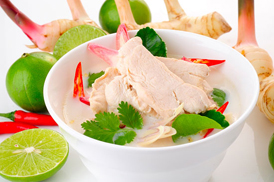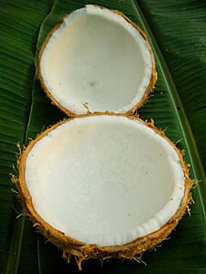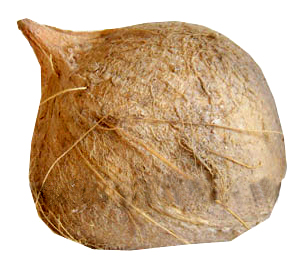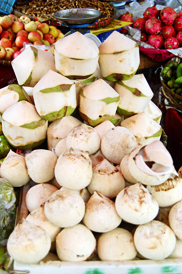
| ||||||||
Coconut and Cholesterol
Many customers and friends have expressed concern regarding consuming coconut milk and its effect on the cholesterol level. Coconut is integral to the Thai diet so we have tried to present a balanced picture of the most recent research here. What is Cholesterol? "Cholesterol is a fat-like substance found in all animal cells, human and otherwise. It is essential to life. The human body manufactures all the cholesterol it needs-thus we can live without eating any cholesterol. Cholesterol is attached to protein packages called lipoproteins, which are assembled in the liver and circulate in our bloodstream. Two of the better known types of lipoproteins are HDL (high-density lipoprotein), the "good" type that carries cholesterol out of the system; and LDL (low-density lipoprotein), the "bad" or "lousy" type that deposits cholesterol in arterial walls, where it can build up and narrow arteries. High blood cholesterol is a known risk factor for heart attack." (Source:UC Berkeley Wellness Letter, Answering Nine of Your Cholesterol Questions). What is the Difference Between Saturated and Unsaturated Fats? "By consuming oils we effect our bloods cholesterol. All vegetable oils are pure fat, and all are combinations of saturated and unsaturated fatty acids. Fatty acids vary in their degree of saturation and in the length of their molecules. Saturated fats carry all the hydrogen atoms they can hold. Such fats come chiefly from animal sources, such as meat and whole milk. Three vegetable oils- coconut, palm and palm kernal - are also highly saturated. Saturated fats are usually solid at room temperature. Unsaturated fatty acids are missing some of their hydrogen atoms and are liquid at room temperature. If one pair of hydrogen atoms is missing, the fatty acids are called monounsaturated. Olive, peanut, and canola oil are made up chiefly of monounsaturated fatty acids. If two or more pairs of hydrogen atoms are missing, the fatty acids are called polyunsaturated. Corn, safflower, soybean, and sesame oils are largely polyunsaturated. Fish and nuts are also rich sources of mono- and polyunsaturated fats. No fat or oil in our diet is made of just one kind of fatty acid. Even olive oil is about 20% saturated fatty acids; butter is about 65% saturated fatty acids, with the rest mono- and polyunsaturated." (source: UC Berkeley Wellness Letter, February 1999; Olive Oil, Beyond the Hype) The Real Culprit - Trans Fatty Acids "Recently what has become apparent is that trans fat is a key part of the picture. Gram for gram, trans fatty acids are actually much worse than saturated fats because they have about the same adverse effects on LDL cholesterol, but unlike any other type of fat, trans fat reduces HDL cholesterol and increases triglycides and another undesirable blood fat, lipoprotein (a). That all adds up to a potent adverse effect on heart disease risk. (source: Got Fat? Exploding Nutrition Myths - an interview of Harvard Prof. Walter Willet) "The food industry ...accepted the evidence that vegetable fats, vegetable oils, would be better than animal fats, and that really led to the development and promotion of the margarine industry and Crisco, baking fats that were made from vegetable oils. But they were made by a process called partial hydrogenation, which converts a liquid oil, say like soybean oil or corn oil, to something like margarine or vegetable shortening. As it turns out that was a very disastrous mistake, because in the process of partial hydrogenation, a totally new type of fat is formed called trans fat. The evidence has now become very clear that trans fat is far worse than saturated fat." (source: PBS Frontline, Diet Wars: an interview of Walter Willett, M.D. Chair, Deptarment of Nutrition, Harvard School of Public Medicine. ) A Voice for Saturated Fats Today, not everyone in the scientific community is in agreement regarding the effect of saturated fats in the diet. One woman in the forefront of defending saturated fats, is Dr. Mary G. Enig, Nutritional Sciences Division Enig Associates, Inc. Recently she published a book(available on Amazon) entitled "Know Your Fats: The Complete Primer for Understanding the Nutrition of Fats, Oils and Cholesterol". As a research scientist, she has published numerous studies on saturated fat, including tropical oils. She proposes that there is much misinformation and misunderstanding in the medical community and press regarding the effects of natural saturated fats in the diet. Tropical oils in particular have received much undue criticism in large part because of economic motivations of the American oil industry. Tropical oils may in fact actually help prevent Chronic Heart Disease (CHD) according to some studies. For instance, a study in 1981 showed that islanders with high intakes of coconut oil showed "no evidence of the high saturated fat intake having a harmful effect in these populations". When these groups migrated to New Zealand, however, and lowered their intake of coconut oil, their total cholesterol and LDL cholesterol increased, and their HDL cholesterol decreased. Beneficial Lauric Acid in Coconut
One of the real culprits in CHD is in fact trans-fatty acids, found in hydrogenated vegetable oils (like Crisco). Ironically when fast food chains and bakers were forced to discontinue using tropical oils, these types of oils were their replacement. Mainstream medical research still believes that tropical oils are not any more healthful though and continue to propose that the most healthful cooking oils available today are vegetable oils like canola, olive, etc. (made largely of monounsaturated fatty acids). Dr. Enig would disagree saying that when these types of vegetable oils are heated to a high temperature their molecular structure changes for the worse making them unhealthy for the body. Tropical oils, on the other hand, are much more stable when heated. More recently researchers have recognized that the ratio of LDL to HDL is more important than the number by itself. Dr. Enig's studies show that a diet including coconut oil while having a higher level of LDL, it is counter balanced by a higher level of HDL. Trans fatty acids on the other hand decrease HDL and increase LDL- a dangerous effect. More information on Mary G. Enig and her work "Mary G. Enig, holds an M.S. and Ph.D. in Nutritional Sciences from the University of Maryland, College Park and was a Faculty Research Associate in the Lipids Research Group, Department of Chemistry and Biochemistry, University of Maryland. She is the Director of the Nutritional Sciences Division, Enig Associates, Inc.; President of the Maryland Nutritionists Association; and a Fellow of the American College of Nutrition. She is an expert in fats and oils analysis and metabolism, food chemistry and composition, and nutrition and dietetics, and a consulting nutritionist/biochemist of international renown. Enig has authored numerous journal publications, mainly on fats and oils research and nutrient/drug interactions, has written "Know Your Fats" (published May 2000 by Bethesda Press, Silver Spring, MD) for consumers and clinicians on fats and oils, has appeared on national radio programs, international and cable television programs, and is a popular invitelecturer for medical and allied health groups in the U.S." — Orignal Source: http://philsoc.org/2000Fall/2123abstract.html (not currently active) For a recent article (2008) from Dr. Mary Enig defending Coconut Oil please see her site, Weston A. Price, The Latest Attack on Coconut Oil. Also see on the same site, Thailand: Land of the Coconut, about the health of the Thai population who eat coconuts on a daily basis in all forms. More recent articles: Thai Food and All That Coconut Milk, Philadelphia Inquirer, Sep. 27, 2010; Got Coconut Milk?, by Elena Conis, Special to the Los Angeles Times, March 22, 2010. Note: These ideas are presented here so that you can make your own decisions about your diet. We are in no way affiliated with Mary Enig and do not necessarily agree with her conclusions or for that matter with any of the research mentioned above. Last updated October 1, 2010 |
||||||||

 Coconut is integral to the Thai diet but is nutritional? Get the facts regarding the effects of coconut milk on cholesterol levels.
Coconut is integral to the Thai diet but is nutritional? Get the facts regarding the effects of coconut milk on cholesterol levels.




